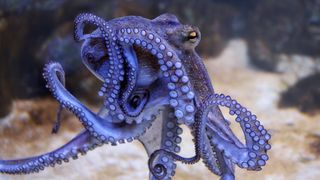Octopuses, squids and lobsters could become 'sentient beings' in the UK
The decision comes after a new study reviewed hundreds of scientific papers on pain reception among the invertebrate groups.

A number of marine animals — including octopuses, squids, crabs and lobsters — will be recognized as sentient beings as part of a new law proposed by the U.K. government.
The Animal Welfare (Sentience) Bill was first proposed in May and is currently under review. The proposed law originally included all vertebrates, or animals with a backbone, but no invertebrates. However, on Nov. 19, the U.K. government announced that two invertebrate groups — cephalopod mollusks (octopuses, squids and cuttlefish) and decapod crustaceans (crabs, lobsters, shrimp and crayfish) — will now be included on the list of sentient beings, which means their welfare will have to be considered when future government decisions are made about them..
The driving force behind this addition was a new report published Nov. 19 by The London School of Economics and Political Science (LSE), which reviewed evidence from hundreds of scientific studies on these two invertebrate animal groups.
Related: 8 crazy facts about octopuses
"After reviewing over 300 scientific studies, we concluded that cephalopod molluscs and decapod crustaceans should be regarded as sentient, and should therefore be included within the scope of animal welfare law," lead researcher Jonathan Birch, a philosopher of biological sciences at LSE, said in a statement. "I'm pleased to see the government implementing a central recommendation of my team's report."
Historically, it has been hard to prove sentience in animals because it is difficult to define.
"Sentience is the capacity to have feelings, such as feelings of pain, pleasure, hunger, thirst, warmth, joy, comfort and excitement," the researchers wrote in the report. However, pain reception is now widely considered to be the central criterion policymakers consider when drafting new legislation on animal welfare, they added.
Sign up for the Live Science daily newsletter now
Get the world’s most fascinating discoveries delivered straight to your inbox.
The new study focused on evidence for different forms of pain reception, such as the possession of pain receptors and specific brain regions associated with pain, as well as behavioral experiments that show that these animals make choices to avoid painful or stressful scenarios.
Being recognized as sentient means that the welfare of cephalopods and decapod crustaceans will have to be considered in any future decision-making processes, according to the U.K. government. "The Animal Welfare Sentience Bill provides a crucial assurance that animal wellbeing is rightly considered when developing new laws," Lord Zac Goldsmith, the U.K.'s animal welfare minister, said in the statement. "The science is now clear that decapods and cephalopods can feel pain, and therefore, it is only right they are covered by this vital piece of legislation."
However, the new listing will not affect existing legislation surrounding these animals. This means several questionable practices — such as selling animals to untrained handlers, transporting animals in ice-cold water and boiling animals live without stunning them and other extreme slaughter methods remain legal even for sentient animals.
The researchers are now calling for these practices to be outlawed.
Boiling lobsters alive without stunning them is already illegal in the U.S., Switzerland, Norway, Austria and New Zealand, according to IFLScience.
Originally published on Live Science.

Harry is a U.K.-based senior staff writer at Live Science. He studied marine biology at the University of Exeter before training to become a journalist. He covers a wide range of topics including space exploration, planetary science, space weather, climate change, animal behavior, evolution and paleontology. His feature on the upcoming solar maximum was shortlisted in the "top scoop" category at the National Council for the Training of Journalists (NCTJ) Awards for Excellence in 2023.
Most Popular

